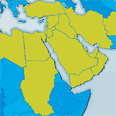
Turkey's regional power growing
For the moment, Turkey seems to be a major winner in the midst of the unrest in the Mideastern and North African Muslim world. This is not a result of anything it has done, but derives largely from the loss of power of other nations.
As far as population is concerned, there are three major nations in the Middle East – Turkey, Iran and Egypt, each with 70-80 million inhabitants. Saudi Arabia has a substantially higher Gross Domestic Product per capita than all three, but its population of 25 million is much smaller.
Regional Jem
Hagai Segal
Op-ed: Mideast turmoil makes one wonder about world’s focus on tiny Israel, generosity to Arabs
For Turkey, the Iranian situation offers two alternative scenarios. The first one is that Ahmadinejad stays in power, but is weakened. In this case Turkey, due to the Western sanctions against Iran, can substantially develop its exports there. The second scenario is that the mullah regime falls. There may be ongoing unrest in Iran, yet this is unlikely to inconvenience Turkey too much because its own power centers are located in cities rather far away from the Iranian border. In that scenario, Iran as a competitor for hegemony in the Middle East falls by the wayside.
A new kind of Ottoman “empire” may emerge - no longer colonial in nature but one of influence. Foreign Minister Ahmet Davutoglu is an academic who promotes “neo-Osmanism”, a kind of Turkish Muslim commonwealth. A decline in influence of other countries in the region will subsequently also change the rules for those who need protection. If the Iranian regime collapses, not only Hamas with whom Turkey has good relations but several countries and groups including Hezbollah, will soon have to turn to Turkey for guidance and assistance of various kinds.
Turkey’s situation in the West has also improved further, due to its stability in a region of increasing instability. As a member of NATO, it has access to a large number of defense secrets of the West. As it is unlikely that Turkey will gain access to the European Union, it still can play its game showing that the EU is snubbing it, thereby justifying verbal attacks on some member countries.
In the meantime, there remain allies in the EU for the promised acceptance of Turkey as a member country. Its strongest supporter is Britain, but there are others as well, for instance Sweden and Belgium (which held the European presidency until recently.) In Germany former socialist chancellor Gerhard Schröder this week again came out strongly in support of EU membership.
Turkey does not have to worry – if it is not brought in as an EU member, it will have to be bought off with substantial economic concessions to compensate for the change in European policies. Thus, it can simultaneously benefit from the EU and claim that it has been cheated by it.
Jews as litmus test
Many ask where enigmatic and undiplomatic Turkish Prime Minister Recep Tayyip Erdogan wants to take his country. In the meantime he seems to want it to eat from all sides of the cake.There are increasing signs of the failure of the integration of substantial numbers of Turkish immigrants into several Western countries, in particular, Germany. Erdogan is undoubtedly not pleased about the sharp turn away from multiculturalism by the German government. For one reason or another, he may try to stir up more trouble among non-integrated Turkish immigrants there and elsewhere in Europe.
Thereafter he may show signs of reconciliation again. It may be difficult for quite some time to understand to what extent he is shifting positions rather than just benefitting as much as possible from whatever opportunities he sees. The best early comprehension of this can probably be gained from closely watching Turkey’s attitudes toward Israel and the Jews.
As in many other situations, attitudes toward Israel and the Jews are early indicators of political shifts. In 2004, Erdogan accused Israel of state terrorism. To mend the fences, he came on a visit in 2005. In hindsight we can understand this as an early sign of eating from two sides of the cake. Israel was the first to be confronted with this behavior. However, it was not the only one.
In 2008 during a speech in the German city of Cologne, Erdogan upset many Germans with remarks about the integration of Turkish immigrants into the country, stressing that they should not assimilate. This was particularly relevant as Germany has the largest number of Turkish residents in Western Europe. This week, during a visit to Germany he said that Turkish children born in Germany should consider Turkish as their native tongue. He also claimed that there were now five million Turks in the EU, including three million in Germany.
The Turkish Jewish community is one of the few remaining in a Muslim country. Local Jewish scholar Rifat Bali doubts whether it has a future. He says that in recent years, the community has become the target of many verbal attacks from the country’s Islamists and nationalists. Bali writes that in a country where widespread anti-Israeli resentment and anti-Semitism already exist, it came as no surprise that the public perceived the Gaza flotilla affair as the murder of Muslim Turks by the Jewish army and started asking Turkish Jews whose side they were on.
In the final analysis, Erdogan may be able to maintain his ambiguous attitude for a long time to come. Fundamentally, however, Turkey is not a world power. It cannot project itself as being above its league forever. In essence, Turkey is largely a regional power in an economically un-advanced environment. That becomes even clearer when one realizes that its Gross Domestic Product per capita is less than one third of Israel’s.
Dr. Manfred Gerstenfeld has published 19 books, several of which deal with international relations.
- Follow Ynetnews on Facebook















